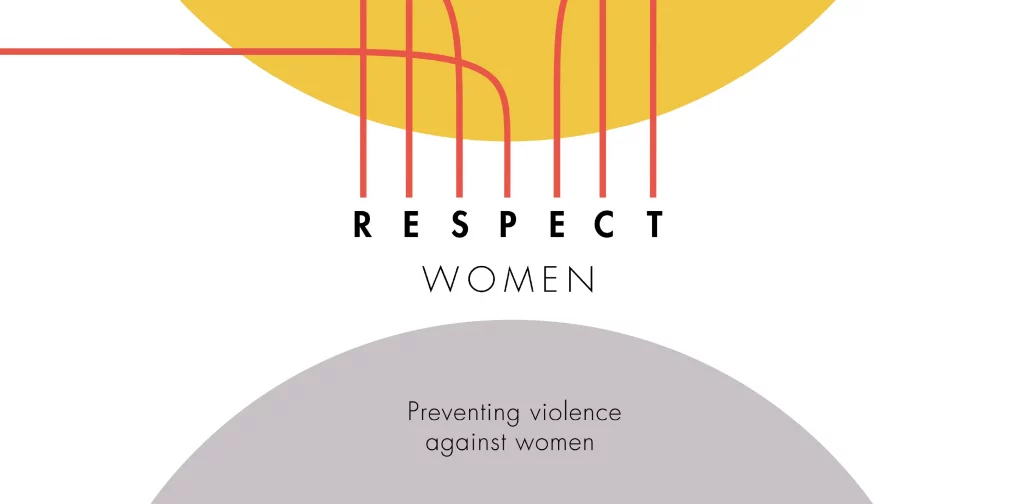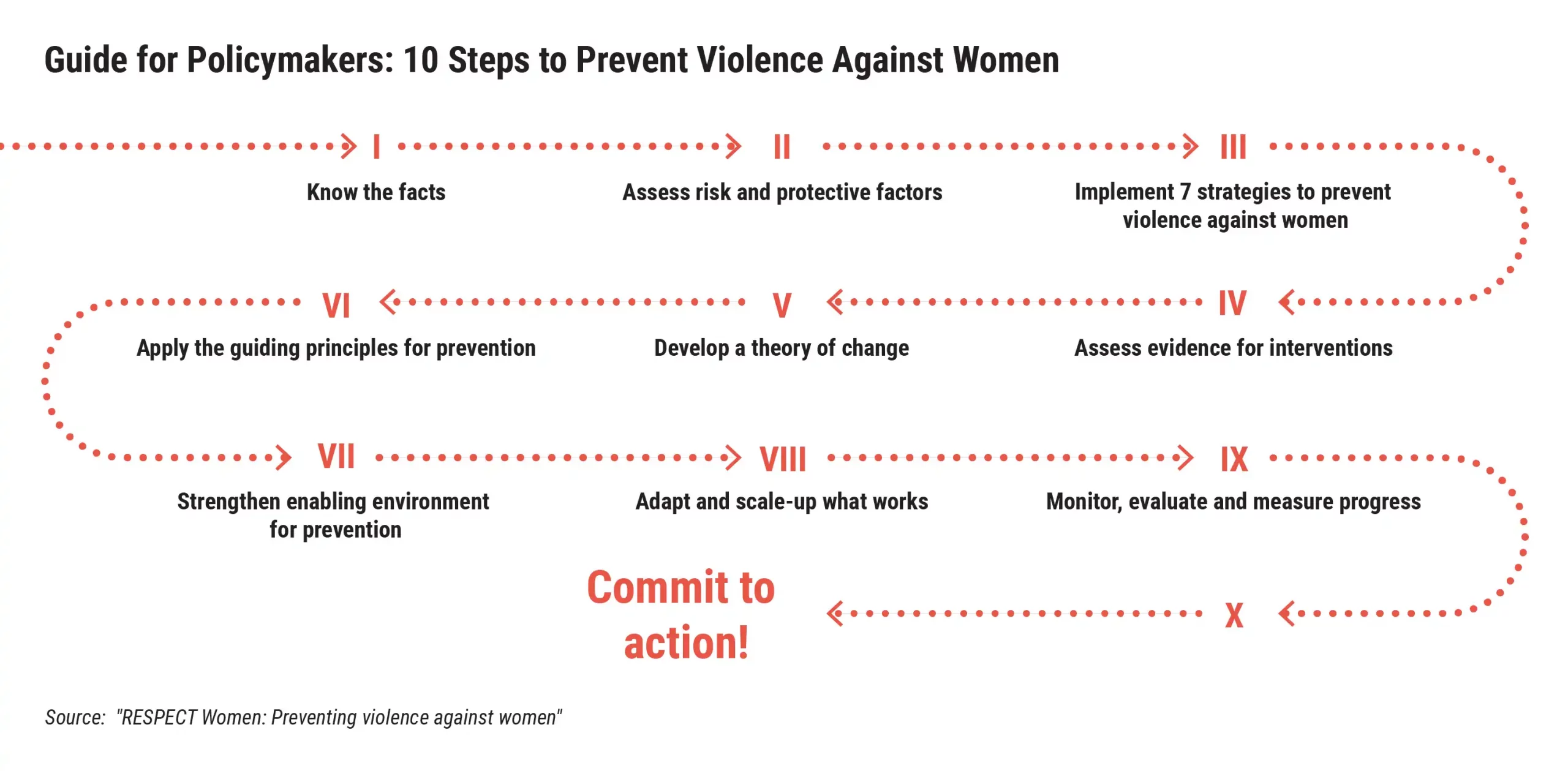RESPECT: A Framework to Prevent Violence Against Women

Photo: UN Women.
The fight to achieve gender equality and women’s empowerment goes back centuries. Yet, there is still a long way to go. Until now, gender-based violence remains a pervasive problem in societies. Almost one in three women worldwide has been subjected to physical and/or sexual violence at least once. In this light, preventing violence against women becomes vital and urgent. Among the efforts to address this issue is the RESPECT framework that provides guidance for policymakers to prevent violence against women.
Violence Against Women in Asia and the Pacific
Physical, sexual, or psychological gender-based violence can occur anywhere from anyone. However, husbands or male intimate partners are the most widespread perpetrators globally. The 2023 data on sustainable development progress shows that no country in the world is close to eradicating intimate partner violence. So far, only 88 countries explicitly criminalize marital rape.
In 2017 alone, about 20,000 women were killed by family members or intimate partners in Asia. WHO estimates that 33% of partnered women aged 15–49 in Southeast Asia will experience intimate partner violence at least once in their lives.
In Asia and the Pacific, 75% of women have experienced sexual harassment. Furthermore, violence against women in this region encompasses many other issues, such as street harassment, digital harassment, image-based sexual abuse, forced marriage, child marriage, dowry-related violence, stigma around menstruation, lack of access to menstrual products, and lack of access to justice and survivor-centered support systems.
The RESPECT Framework
“RESPECT Women: Preventing violence against women” was published in 2019 by UN Women, the World Health Organization, and twelve other agencies. The RESPECT framework is a comprehensive, evidence-based guide to help policymakers design, plan, implement, monitor, and evaluate policies and programs to prevent violence against women.
The RESPECT framework continues to undergo reviews and updates. In 2020, an Implementation Package was launched to support national- and sub-national-level interventions further. Additionally, a new systematic review to add data on evidence and gap map between high- and low-and-middle-income countries was completed in 2022.
Several countries have used the RESPECT framework to create policies and programs that address gender-based violence. Among them are:
- The Bangladeshi Association for Life Skills, Income and Knowledge for Adolescents (BALIKA) program utilized educational support, gender rights awareness training, and livelihood training in three districts of Bangladesh to empower girls aged 12 to 18 and delay marriage.
- The Right to Play program in Pakistan used sports and play activities with children on the brink of adolescence to prevent school-based violence in Hyderabad.
- The Zindagi Shoista (“Living with Dignity”) program in Tajikistan used a family-centered approach to work with 80 families in four villages to transform perspectives, attitudes, and social norms to strengthen relationships and empower women economically.
- Other countries, such as Bhutan, Nigeria, Vietnam, and Indonesia, have held RESPECT workshops with participants from governments, civil society, UN agencies, and academic institutions.
7 Strategies to Prevent Violence Against Women
The framework includes 10 steps for policymakers to follow for implementation.

The RESPECT framework is centered around the seven strategies to prevent violence against women, with each letter in the word “RESPECT” representing one strategy:
- Relationship skills strengthened – strengthening people’s interpersonal communication and conflict resolution skills and promoting equitable decision-making.
- Empowerment of women – enabling women to build self-efficacy, assertiveness, confidence, and negotiation skills.
- Services ensured – providing health, police, legal, and social services for survivors of violence to mitigate its consequences and prevent recurring violence.
- Poverty reduced – alleviating household poverty and reducing poverty-related stressors or triggers of violence.
- Environments made safe – creating safe schools, work environments, and public spaces.
- Child and adolescent abuse prevented – promoting gender equitable and nurturing relationships between and among parents, educators, children, and adolescents.
- Transformed attitudes, beliefs, and norms – challenging harmful gender attitudes, beliefs, and stereotypes and promoting egalitarian norms.
Of course, preventing violence against women requires bold and systematic changes to the existing systems. It is a complex process that varies depending on a country’s economic, social, cultural, and environmental conditions. Therefore, frameworks like RESPECT can serve to simplify the daunting process for countries to start their collaborative, inclusive, and just transformations toward eradicating violence against women.

Co-create positive impact for people and the planet.
Amidst today’s increasingly complex global challenges, equipping yourself, team, and communities with interdisciplinary and cross-sectoral insights on sustainability-related issues and sustainable development is no longer optional — it is a strategic necessity to stay ahead and stay relevant.


 Indian Gig Workers Push Back Against 10-Minute Delivery Service Strain
Indian Gig Workers Push Back Against 10-Minute Delivery Service Strain  Call for Governance: Grassroots Initiatives Look to Scale Efforts to Conserve Depleting Groundwater
Call for Governance: Grassroots Initiatives Look to Scale Efforts to Conserve Depleting Groundwater  Integrating Environment, Climate Change, and Sustainability Issues into Education Systems
Integrating Environment, Climate Change, and Sustainability Issues into Education Systems  Finally Enforced: Understanding the UN High Seas Treaty
Finally Enforced: Understanding the UN High Seas Treaty  Risks and Opportunities of Submarine Communication Cables for Sustainable Development
Risks and Opportunities of Submarine Communication Cables for Sustainable Development  Rising Attacks and Violence Against Land and Environmental Defenders
Rising Attacks and Violence Against Land and Environmental Defenders